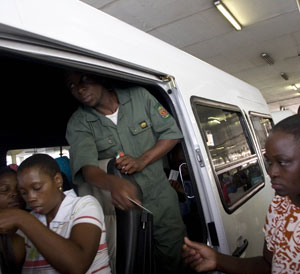The new taxi-payment card system, which is rapidly replacing the old cash-payment system on many routes, is proving a hit with most commuters, though some think it is a miss.
This week I took a detour from my taxi route home after a long day at work. I made my way over the mess of Johannesburg pavements and malfunctioning traffic lights and landed on the platforms of the bustling Noord Street taxi rank at rush hour. I paused and observed how the card system is revolutionising commuting on the Johannesburg to Pretoria route.
At first glance, I noticed that queues for taxis have shortened and that taxis fill up quicker. In addition, commuters don’t have to worry about counting taxi fares.
The new system uses three cards — green, red and white. The green and red cards are daily single-trip cards, which the commuter buys at a card sales counter at the taxi rank and all serve exactly the same purpose. Once the commuter is on board, the driver then takes these cards back. The white card is prepaid and belongs to the holder until expiry.
 Tebogo Mosiathupa (28) of Johannesburg
Tebogo Mosiathupa (28) of Johannesburg
”The queues are too long and we end up getting late.”
(Oupa Nkosi)
The commuter loads as much money as they please on to the card, which can also be used to pay for more than one person, such as a child or companion.
‘No more fights, no more quarrels’
Tebogo Mosiathupa (28) of Johannesburg is a self-employed commuter who uses the Pretoria and Johannesburg route daily and welcomes the new system. ”I think this system is going to make travelling by taxi very easy, he says.
Mosiathupa says, however, while the cards have done away with the queues for taxis, there are now often very long ones at the card sales counter. ”Come here on Fridays or month end, you’ll be disgusted. The queues are too long and we end up getting late. But sometimes I console myself that I’d rather be late than getting into trouble for miscounting the taxi driver’s money.”
This new system cannot be as bad as the old one, said David Rakale (27) from Brits.
”I will speak for myself on this one because I hated counting the money in the front seat and I remember the fights and the quarrels. I am happy that from now on, the only relationship between drivers and commuters is for them to take us where we want to go. No more fights, no more quarrels,” Rakale laughs.
 David Rakale (27) from Brits
David Rakale (27) from Brits
”No more fights, no more quarrels.”
(Oupa Nkosi)
The new system has also created jobs. Thulani Radebe (24), of Senaoaone in Soweto, who checks and collects daily trip cards from commuters, thinks the new system is a ”gift of the gods”.
He works the noon to 9pm shift every day, which he says can get a little crazy after 4pm.
”I was unemployed for a long time but today I have a job. Thanks to this system I now can take care of myself and help out at home,” he says.
Radebe says the new system ensures better security for commuters and it saves them from commonplace confrontations between drivers and their passengers.
” Now commuters are insured and will be compensated in the event of an accident. All they need to do is make sure that they have their cards all the time and they’ll be fine. But I still think the queue for card sales is problematic and needs attention,” he adds.
‘Waste of time’
But not everybody thinks the new system is a success. For Promise Kgwate (25) of Hammanskraal, the new system is a waste of time.
”Look, I use this route every week and there are days when both the card and taxi queues are long. There are days when I get home after 9pm,” Kgwate complains.
”I think this system is a great development but it has its flaws. The old one had its problems as well, but we were used to it,” Kgwate says.
 Promise Kgwate (25) of Hammanskraal
Promise Kgwate (25) of Hammanskraal
”New system is a waste of time.”
(Oupa Nkosi)
As the sun dips behind Johannesburg’s drab grey buildings, signalling the end of yet another day, I also decide to end my long observation. I come to the realisation that regardless what the commuters or the reluctant and invariably infuriated taxi drivers say, the new card system is more of a hit than a miss.
And as I stand on the long and meandering taxi queue to Kagiso (this route uses the old cash system for payment) my mind switches to overdrive. Then I hiss a silent prayer through my teeth: ”Oh lord, please don’t make me sit in the front seat … my arithmetic sucks.”
 On the bus
On the bus
Passengers queue — cards in hand — at the Noord Street taxi rank.
(Oupa Nkosi)